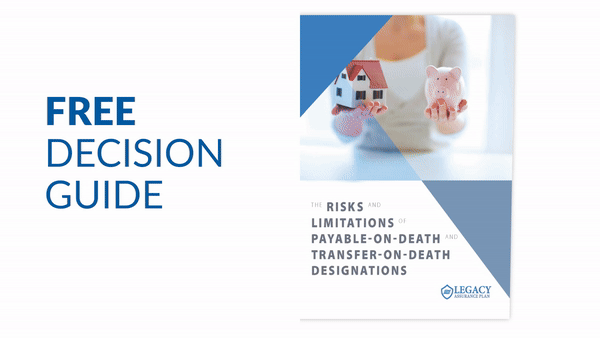Pay-on-death (PoD) accounts are a popular estate planning tool that allows individuals to designate beneficiaries who will receive the assets in the account upon the account holder's death. These accounts are often used to bypass the probate process, providing a more straightforward and quicker transfer of assets to beneficiaries. However, while PoD accounts offer certain advantages, they also come with potential risks and pitfalls that must be carefully considered.
What are pay-on-death accounts?
A PoD account is a type of bank account or financial product that allows the account owner to designate one or more beneficiaries who will automatically receive the funds in the account when the owner dies. Common types are checking and savings accounts, certificates of deposit (CDs) or U.S. savings bonds. PoD accounts often only require a simple form to designate the beneficiaries. The primary advantage of a PoD account is that it allows the transfer of assets without going through probate, which can be a lengthy and costly process.

Advantages of pay-on-death accounts
- Avoidance of probate. The primary benefit of a PoD account is that it bypasses the probate process, allowing for a quicker and more direct transfer of assets to the named beneficiaries.
- Simplicity. Setting up a PoD account is generally straightforward and does not require the involvement of an attorney or complex legal documents.
- Flexibility. The account holder can change the designated beneficiaries at any time without needing to alter a will or trust.
What are the potential risks of PoD accounts?
While PoD accounts offer several benefits, they also come with potential risks and unintended consequences that should be carefully considered. They include:
- Conflicts with estate plans. One of the most significant risks associated with PoD accounts is the potential for conflicts with other estate planning documents, such as wills or trusts. The beneficiary designation on a PoD account takes precedence over any conflicting instructions in a will or trust. This can lead to unintended distributions if the account holder does not update the beneficiary designations to align with their overall estate plan.
- Lack of contingency planning. PoD accounts typically do not allow for the naming of contingent beneficiaries. If the primary beneficiary predeceases the account holder and no alternate beneficiaries are named, the assets may revert to the estate and be subject to probate. This lack of flexibility can complicate the distribution process and lead to disputes among heirs.
- Potential for unequal distribution. If an account holder has multiple PoD accounts with different beneficiaries, there is a risk of unequal distribution of assets. The value of each account at the time of the account holder's death may vary, leading to disparities among beneficiaries.
- Exposure to creditors. While PoD accounts bypass probate, they do not protect assets from creditors. If the account holder has outstanding debts or tax liabilities at the time of their death, creditors may have claims against the PoD account assets.
What are common mistakes in estate planning with PoD accounts?
Failure to update beneficiaries
One of the most common mistakes is failing to update beneficiary designations on PoD accounts. Life changes such as marriage, divorce or the birth of a child should prompt a review and update of all beneficiary designations to ensure they reflect the account holder's current wishes.

Overlooking tax implications
While PoD accounts often bypass probate, they may still be subject to state inheritance taxes. Account holders should consider the tax implications of their estate planning decisions and consult with a financial professional or estate planning attorney to minimize tax liabilities.
Ignoring the need for comprehensive planning
Relying solely on PoD accounts for estate planning can lead to gaps in the overall plan. A comprehensive estate plan should consider all assets and include documents such as wills, trusts and powers of attorney to address various scenarios and ensure that the account holder's wishes are carried out.
Here are some suggestions on how to avoid common pitfalls:
- Regular reviews. Periodically review and update all estate planning documents, including PoD account beneficiary designations, to ensure they align with current wishes and circumstances.
- Consult professionals. Work with estate planning professionals to develop a comprehensive plan that addresses all aspects of the estate and considers potential tax implications.
- Communicate clearly. Discuss estate planning decisions with family members and beneficiaries to avoid misunderstandings and disputes after the account holder's death.
One notable case that highlights the risks associated with PoD accounts involved a woman named Jane, who had set up her estate plan with the intention of leaving equal shares of her assets to her three children. To simplify the process and avoid probate, she designated her oldest child, John, as the beneficiary of her bank account using a PoD designation, assuming he would distribute the funds equally among his siblings after her death.
However, when Jane passed away, the PoD account transferred directly to John, bypassing probate and the terms of her will. Unfortunately, John, either due to a misunderstanding or a change of heart, decided to keep all the money for himself. This outcome was contrary to Jane’s wishes and caused significant family discord. The other two siblings had no legal recourse to claim their share because the PoD designation superseded the will, leaving them with nothing from that account.
This case underscores a critical point in estate planning: PoD designations, while useful for avoiding probate, can lead to unintended consequences if they are not carefully coordinated with the rest of the estate plan. In this situation, Jane's failure to communicate her intentions clearly or to legally enforce the equal distribution through her will resulted in an outcome that was far from what she had intended.
The lesson from this case is the importance of regularly reviewing and updating estate planning documents, including PoD accounts, to ensure they align with overall estate planning goals. Consulting with an estate planning attorney can help prevent such unintended outcomes, ensuring that beneficiaries receive what the grantor truly intended.
Conclusion
Pay-on-death accounts can be a valuable tool in estate planning, offering a straightforward way to transfer assets and avoid probate. However, they are not without risks and should be used as part of a broader, comprehensive estate plan. By understanding the potential pitfalls and taking proactive steps to address them, individuals can ensure that their estate planning goals are achieved and their loved ones are provided for.



